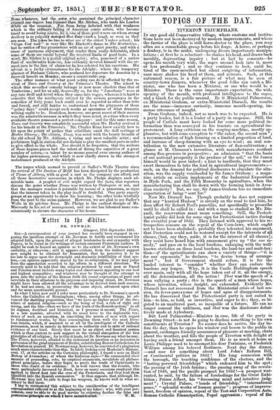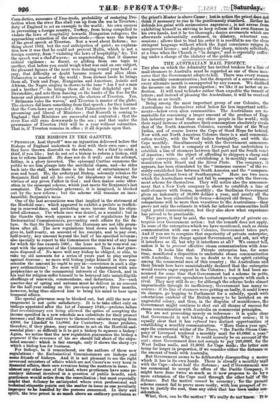TOPAOS OF THE DAY.
"Cape: Cod Heekett's dance in' The lientnehion'; the farrier of the place is still horse-doctor to the place, you may but hetilittleg off-his' leekeesteiek with an air of quiet gravity, and with a often gee remarkable group before his forge. A horse, or perhaps " tliht render them really delectable, albeit a donkey, is in the midst, wide ing divers importunate mimipu- d the received limits of good taste. In a , lotions at first he is reluctant—he shakes his head, and draws back e'hal actor; who, possessed of a native ' moodily, deprecating inquiry ; but at last he consents—he 'exidently devoted himself with the ut- opens his mouth very wide, the sages around look into it, more
d C ti e village, where customs and institu-
1 h 11 an goo o =serve v among flax-growers in perspective; an admission "that the basis of our national prosperity is the produce of the soil," or Sir James himself would be poor indeed; a hint to landlords, that they must exert themselves to take the lead in agricultural improvements ;— ow Mr. Disraeli has. Though probably he does not suppose that any "hurried Hudson" is already on the road to find him, he does affect Sir Robert Peel's punctilio, not specifically to prescribe until he shall be called in: and with a man so studied as -Mr. Dis- raeli, the reservation must mean something. Still, the Protect- ionist public did look for some sign for Protectionist tactics during the eventful year of 1852. They listened with approval to his re- trospective censure on the repeal of the Corn-laws, which ought not to have been abolished; probably they tolerated his argument, that Protection could not be restored except for the interests of all classes, [but, say they, aside, it is for the interest of all classes]; they must have heardhim with amazement give up "the one re- medy," and pass on to the local burdens, enlarging with the well- known statistics on those local burdens, the land-tax and malt-tax: then—if the agriculturists can show a variety of things—" it is for our opponents," he declares, "to devise terms, of arrange- ment" ; but if Government should refuse, it is for the landed interest to " consider " whether they can endure the burdens any longer. Why, it is the Castle Heddingham speech over again, only with all the hope taken out of it, all the energy, all the determination, all the action! That west the speech of a man rallying a party; this is the speech of a man whose hopes, whose invention, whose insight, are exhausted. Evidently Mr. Disraeli has not recovered from the Ministerial crisis of last ses- sion, its fever-paroxysms of hopes and ague of disappointments. He has discovered that the Protectionist party is not suited to him, so bold, so inventive, and eager to do; they, so bi- goted to an unaltered past, so incapable of a future. He can no longer conceal the unfitness, and that was the disclosure defini- tively made at Aylesbury. But Lord Palmerston—Minister in ease, life of the party in Downing Street—is not he going to disclose something to 134 own constituents at Tiverton? No sooner does he arrive, the day be- fore the day, than he opens his window and bosom to the public in general, exchanges friendly assurances of pleasure at meeting, chats about the weather, and fills the people of Tiverton with delight at having sueh a friend amongst them. He is as much at home as Louis Philippe used to be amongst his dear Parisians, or Frederick William among his beloved Berliners. Next day the dinner, —and now for something about Lord John's Reform Bill, or Continental politics in 1852! His long connexion with the borough, the touching confidence of the electors, and the "lasting personal friendships" which endeared him to the spot; the passing of the Irish famine; the passing away of the revolu- tion of 1848, and the pacific prospect for 1852 !—a prospect war- ranted, he said, by the failure of forebodings for the Great Exhi- bition ; Prince Albert, his "foreseeing mind and intuitive judg- ment"; Crystal Palace, "bonds of friendship," "international peace," "splendid works of human genius"; progress of improve- ment, freedom of opinion, repeal of the Test and Corporation Acts, Roman Catholic Emancipation, Papal aggression; repeal of the
autumnal season, is a fair picture of what may be seen at
vival of Town and Country at the Princess's Theatre. The school to country-town dinners, whenever the good folks can catch a Mi- which 64 so-ealled comedy belengs is now more obsolete than that of ulster, one who has been a Minister, or one who would be a Tanketisna ; and let us add, deservedly so, for the " Jonathans " were at Minister. There is the same importunate expectation, the wide any rate droll and novel when they came into vogue, whereas it is hard to opening "of the mouth, with profound intelligence to the sages, conceive that the sentiments uttered by the serious personages in the and a blank for the public around. Be it Ministerial Palmerston, comedies of forty years back could ever be regarded as other than trite ex-Ministerial Graham, or extra-Ministerial Disraeli, the results and forced, and still he,rder to understand how the playgoers of those are the same—immense curiosity, immense mouth-opening, im- " palmy days" could accept such works as specimens of what. dramatic mouse utterance of nought. ought ght to LT. Doubtless, however, one great secret of their success From Graham, indeed, not so much was to be expected. He is was the admirable manner in which they were acted, at a time when every a party leader, but it is a leader of a party in suspense. Still, the available theatre possessed a perfect coman people of Carlisle must have looked for some more political in- Town and Country was eempletelv successful when Mr. Harley revived it for his benefit at the Princess's. 3ir. Charles Bean knew exactly how to formation than was conveyed in his traotate on agricultural- im- hit upon the points of pathos that scintillate amid the dull verbiage of proVement. A long criticism on the reaping-machine, mostly ap- Reuben Olenroy ; the citizen, Cosey, was acted with the hearty breadth of plausive, but with some exception to "the raker, the second man "; the old school by Mr. Addison, a rising and most valuable artist; and a recommendation of high farming on a limited proportion of land, performers high in stationclid not disdain to play the smallest parts in order and increase of sheep-farming with an eye to wool; an oral Den- te give effect to the whole. Nor should it be forgotten, that the authors tribution to the now extensive literature of flaxecultivation • a of these bygone pieces had the talent of fitting the capacities of a great glance at M. Claussen's invention, with manufacturers resident number of actors,—a talent by no-means general even among authors of far higher pretensions, and which is now chiefly shown in the strongest melodrames produced at the Adelphi.
the revival of The Duchess of Ilfalfi has been dissipated by the production such, on the demand for political disclosures to elucidate the situ- of Tinion of Athens, with as good a cast as the company .can afford, and ation, was the supply vouchsafed by Sir James Graham: a mar- tin those decorative accessories in which Mr. Phelps displays such ad- zinc article on certain implements at the Industrial Exposition reirable taste. A prophet of evil might regard the facts, that reporters in Hyde Park, and the Fifth Monarchy in agriculture, when the discuss the point whether Tenon was written by Shakspere or not, and manufacturing lion shall lie down with the farming lamb in Area- that the manager renders it palatable by means of a panorama, as signs dian rusticity! But, we say, Sir Tames Graham has no immediate that the interest taken in the play itself-is doubtful. One party eagerly ex tation of being "sent for." Corn-duties, successes of Free-trade, probability of restoring Pro- tection when. the river Face shall run up from the sea to Tiverton; duty of Fngland to set an example to the world; his own success in preventing a foreign country, Turkey, from being compelled to violate the laws of hospitality towards .Hungarian refugees; the approaching extinction of the slave-trade ;—these were the topics of the great speech at Tiverton. Not a word about Reform ; no- thing about 1852, but the cool anticipation of quiet; no explana- tionliow it was that he could not prevent Malta, which is not a foreign country, from "violating the laws of hospitality," &c. Yet the speech was a chefel'oauvre : so unpretending, that it disarms critical vigilance ; so fluent, so gliding from one topic to another, that before you could weigh what was said on one subject, the pleasant figures of the next were dancing round your head ; so easy, that difficulty or doubt became remote and alien ideas. Palmerston is master of the world : from distant lands he brings them all, Turk and Pope, Hungarian and American, Asiatic and African, the Negro singing in chorus to the tune "Am I not a man and a brother ?"—he brings them all to that delightful spot in Devonshire, and sets them dancing on the banks of the Exe for the honour and pleasure of Ms masters, the electors of Tiverton. Yes, "Britannia rules the waves," and Tiverton is master of the globe. The electors did learn something from that speech ; for they learned that the Corn-laws are repealed ; that Palmerston is the most un- presuming and liberal of Ministers; • that Kossuth is coming to Lngland; that Ministers are successful and contented ; that the river Exe still runs downwards to the sea ; and that under the governance of Tiverton 1852 will be a year without calamities. That is, if Tiverton remains in office ; it all depends upon that.



























 Previous page
Previous page